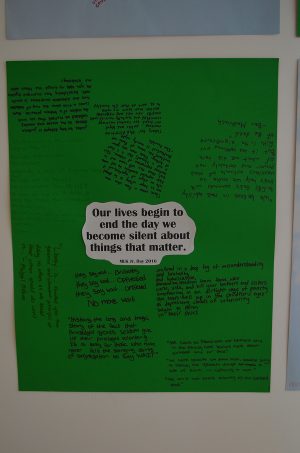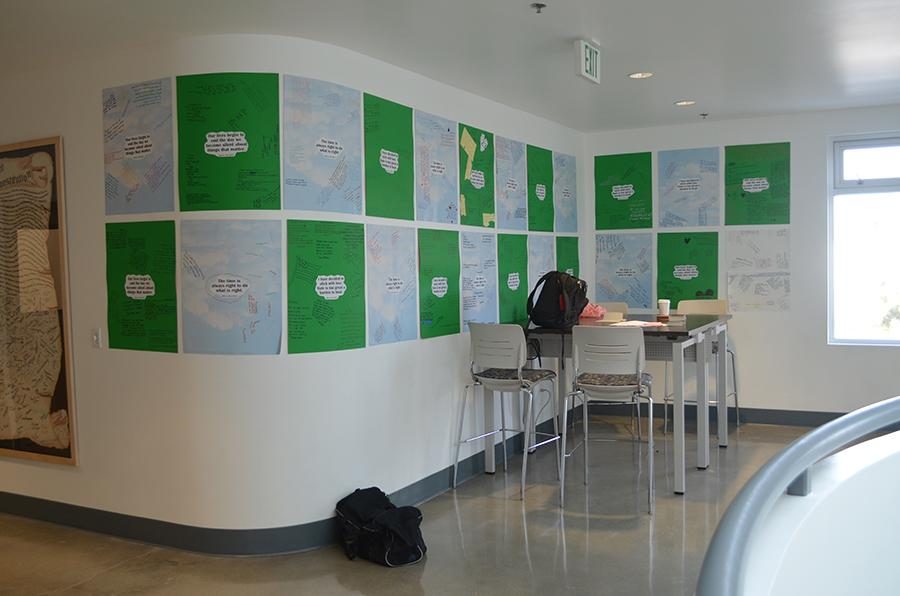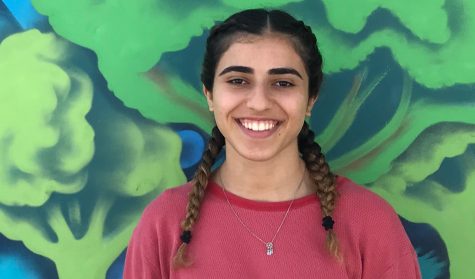No holiday, but three hours of learning and immersion commemorate Dr. King
DISPLAY: Poems written by students on poster boards during MLK Day hang on the walls of the second-floor main hallway since that day.
May 3, 2016
“They say wait … Brutality. They say wait … Oppressed. They said wait … Unsolved. No more wait.”
Combining words drawn from articles, essays and poems by writers from Martin Luther King to Ta Nahisi Coates, students created dozens of unsigned but original reflections on race in America at the end of a morning-long discussion and writing activity in the gym on Martin Luther King Junior Day.
Instead of spending the Jan. 18 holiday at the beach or at the mall, students engaged in a range of activities honoring Dr. King, including a documentary about the children of Birmingham, Alabama, a speech by history teacher Dr. Michael Yoss, and a writing project.

“Usually we have the day off and everyone goes about their business,” said freshman Bailey Mendelson to her grade, reading from a speech written by General Studies Principal Mr. Daniel Weslow to introduce the program, “most likely not reflecting on the man this day celebrates nor what he represents.”Jordan Levine
This year, Bailey continued, students were at school to reflect on the values of the Just Community “by embracing the belief of being an upstander in society, even in the face of fear or intimidation.”
At the end of breakfast, each grade went off into a separate room to watch the documentary. Freshmen watched in the theater, sophomores in the large Beit Midrash, juniors in the small Beit Midrash and seniors in the Art room.
Called Mighty Times: The Children’s March, the film described events of May, 1963, when thousands of African-American children in Birmingham and nearby towns walked out of their schools, against the wishes of their frightened parents, to march for equal rights.
The documentary showed the children meeting with violence, including beating and hosing, from local police officers, and how these demonstrations influenced President John F. Kennedy’s decision to propose legislation that led to the Civil Rights Act of 1964.
After the film, the whole school moved into the gym, where tables had been set up lining the walls. At each table, a group of approximately eight students led by a faculty member read articles about the Civil Rights movement and the situation of African-Americans today.
Students were told to circle words that stood out to them in the readings, and then discussed the texts. After the discussion, using poster boards that were already set up at every table, students wrote poems using the words that they had circled. Most were unsigned.
A student from each group then read one or two poems aloud to the whole school. Over a month later the posters were still displayed on hallway walls on the second floor.
“We know that freedom will never come voluntarily,” wrote one student on a poster board.
“We could not stay away. We could not say no to MLK,” wrote another.
Before the writing project, Dr. Yoss addressed the student body — a rare occurrence. He spoke about growing up in South Africa when it was an apartheid state, and how what he learned from his father motivated him to move away from there. He left under rushed circumstances and moved to England.
Some students were surprised that school was not cancelled for the holiday, as it had been in previous years. But they admitted they would not have thought much about Martin Luther King if they’d stayed home.
“I liked the movie that we watched and I liked Yoss’s speech, but I thought the rest was just excessive and took too long,” said freshman Mikey Kahtan.“[However] If I wouldn’t have gone to school that day, I wouldn’t have learned anything.”














